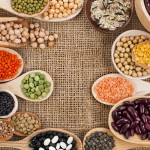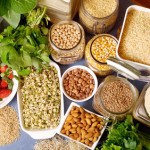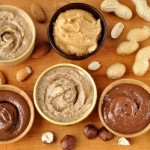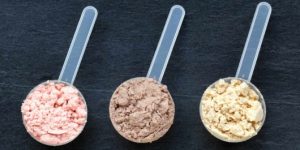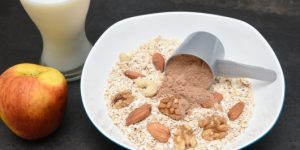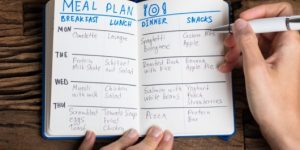A nutritious, healthy, balanced diet needs to accompany physical activity for the best results.
[spoiler title=”Summary: Nutrition- The Basics” style=”fancy”]To be at your healthiest, and to get the most out of your workouts, a healthy diet is a necessity. Be sure to take in a balanced diet daily for the best results, including a variety of protein, carbohydrates, water, healthy fats, vitamins, and minerals. Watching your calories while you take in these beneficial types of food will be great for your health, your figure, and your workout success. [/spoiler]There are pages and pages of nutrition advice available in books and online, but the basic rules are:
- eat from each of the food groups;
- calculate your caloric intake and how much you burn, then eat at a caloric deficit;
- exercise.
It’s not as overwhelming as it might first seem, so don’t panic! Add supplements to your daily regimen to boost vitamins and minerals, and be sensible about your choices. Everything is fine in moderation. It is important not to let your food and nutrition dictate your life, but understand some basics to educate yourself and fuel your body effectively.
What Are Calories And Why do People Count Them?
A food calorie is a unit of food energy. Calories represent the amount of energy contained in the food we eat. The number of calories we ingest is offset by the calories we burn in our daily living. When the energy we intake is less than the energy we use, we lose weight. When our intake is greater than our expenditure, we gain weight.
People count calories as a guide (ultimately an estimate) of how much energy they are taking in versus how much energy they are outputting in their everyday lives. This is usually to achieve a certain goal such as weight loss, weight gain, or weight maintenance.
What is BMR/TDEE? How Many Calories Should I Consume Each Day?
The Basal Metabolic Rate (BMR) is the minimal amount of calories needed to maintain vital bodily functions. It is determined by your height, weight and age. The Total Daily Energy Expenditure (TDEE) is BMR plus whatever daily activities you perform during the day: work, exercise, etc. We have a a BMR calculator here. Keep in mind these calculators are simply estimators; truly determining your BMR and TDEE requires trial and error overtime.
Why Am I Not Losing or Gaining Weight?
If you are not losing weight, the most likely culprit is an insufficient calorie deficit. Mismeasurement of foods or lower activity levels are the most common causes. However, there are a few things that can mask weight loss. Water retention (common with weight lifting) can mask weight loss. For women, the monthly cycle can have dramatic effects on metabolism and water retention and can also mask weight loss. If you have been dieting long term (especially with low carb diets), certain hormones such as leptin become depleted and slow down metabolism. By having a “refeed” or meal high in carbohydrates, these hormones get boosted up and often result in a “whoosh” of weight loss.
If you are failing to gain weight, then you are not eating enough. If you are trying bulk for the first time, you may find it difficult to eat the amount of calories required. Calorically dense foods such as peanut butter, whole milk, nuts, and cheeses are very helpful.
What Is a Balanced Diet?
So, the major premise is that a balanced diet is necessary, but what exactly does a balanced diet include?
Proteins
These are essential to your body, especially muscles. Protein is made up of various amino acids and builds lean muscle tissue. It is essential for repair and recovery of muscles after a workout and the intake should be increased when increasing physical activity. Sources of protein include eggs, lean red meat, and seafood. If you have a strenuous workout planned, eat some good meat, fish or eggs before and after. Did you know that in your diet you should aim for about 1 gram of protein for each pound of body weight?
More About Proteins
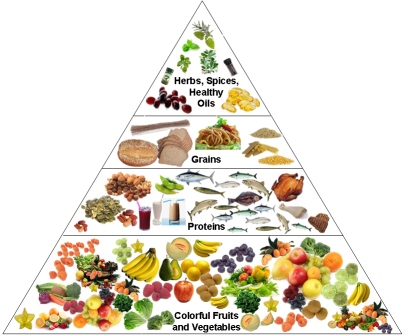
Carbohydrates
Carbs are the fuel that runs the body. Modern society tends to view carbs as bad for the body, when in fact the ability to endure workouts would be made almost impossible without carbohydrates, which slowly release energy. Many diets tell you to cut out carbs altogether, but this has been proven only to have short-term results. No “anti-carb” diet will last the length of time; it’s perfect for the beach body you’re after for next month, but not a healthy lifestyle longer term. Over-consumption of carbohydrates store as fat, so there is some truth in the fact that they should be eaten in moderation, especially on less active days. The reason for this is that carbohydrates are not stored in body tissue, but by your liver and blood in limited amounts. The more you exercise the more carbs you need. The myth that carbohydrates are bad for you stems from refined carbs and sugars that send blood sugar levels soaring. Good, or “healthy,” carbs come from whole fruits, whole vegetables and whole grains. These slowly release the energy you need to be active all day and spiking blood sugar levels.
More About Carbs
Fats
When people see the word fat, they think of the artery-clogging, evil component that ruins bodies. But like carbs, fats are not all bad for you. We need fats in our diet. “Good” fats, such as Omega-3, are central for bodily functions such as metabolism, brain power, and the immune system. The problem with fats occurs when consuming too many saturated fat (such as high-fat dairy) and trans fats (found in sweets). Good nutrition needs a little common sense. Nothing comes easy, but if you learn to pick foods from different groups and keep meals varied, you should develop good habits that you can hold on to for years to come. Sensible eating means avoiding fast food and soda as well as cutting down on alcohol intake. Here are some tips for picking the best fats:
- Choose meat that is from a less fatty cut.
- Eat fatty fish such as salmon.
- Remove poultry skin.
- Choose all-natural, non-roasted, non-salted nuts.
- Use low-fat dairy when possible.
Did you know that the daily recommended intake of calories is 2,500 kcal for a man and 2,000 kcal for a woman? This is a good starting point when developing your personal meal plans.
More About Fats
Water
Water is absolutely crucial for your body. It is recommended to hydrate the body with lots of water (around 8 glasses a day), before, during, and after a workout. In fact, sometimes when you feel hungry, you’re not hungry at all but actually dehydrated. A glass of water will fix the feeling without you needing any food.
More About Water
Some studies show that it is worthwhile to eat some protein and carbs about 2 hours before exercise and some more protein/carbs or a recovery formula or shake within the hour after working out. Again, there’s not hard and fast rule – just do what you can and what feels right to fuel your workouts. Listen to your body! If you feel weak and shaky, up your calorie intake!
Vitamins and Minerals
Most vitamins and minerals are found in a balanced diet. On packets of supplements the RDA (recommended daily allowance) is given, but this is the minimum amount needed per day. There is no harm in boosting certain vitamins and minerals, particularly if you omit certain foods from your diet. Fish oil capsules are a good starting point, as well as Vitamin D for those receiving less sunshine and Creatine for muscle-building and strength. If you are a vegetarian, this is a perfectly health way of living, however excluding meat or animal products from your diet should be replaced with certain vitamins, particular Vitamin B12, Iron, and Calcium to avoid any deficiencies.
Women’s nutritional advice is similar to men’s, but a woman should aim to include more iron in their diet, as well as Vitamin D, calcium, and folic acid for those thinking of having a child.
Generally, certain foods worth introducing to a good diet include:

- Avocado
- Cottage cheese
- Salmon
- Kidney beans
- Chick peas
- Walnuts
When choosing meat, pick lean cuts. Opt for wholewheat bread and pasta and skimmed milk. Tea and coffee are fine in moderation, as is the odd glass of wine, but the milk used in your cup of tea or coffee and the alcohol does add towards your daily calorie intake. Just be mindful of that!
The best “healthy” ways to cook are to steam or boil, bake, grill, or eat raw (vegetables). If oil is necessary, such as for stir frying, use Extra Virgin Olive Oil.
Cooking your own food from scratch ensures that you know what you are putting into your mouth. So get your apron on and the utensils out of the cupboard, invest in a good cook book and experiment. Better still, why not grow some fruits and vegetables in your garden? This could be your new hobby, and how great would your new dinner guests feel knowing they were eating home-grown, healthy food?
Every person is different and if you’re unsure about what your personal calorie intake should be, there are a number of guides online that help calculate your weight/height, your exercise intensity and lifestyle. Some advice states that eating smaller portions, more regularly (5 times a day instead of 3), helps speed up your metabolism and help with blood sugar levels and the same goes for not eating straight before bed.

The most important point to clarify is that under-eating is as bad as over-eating. Starving the body from the calories and nutrients it needs is detrimental to its development and will not cause healthy weight loss. When you deny your body food, not only do you begin to burn muscle, but the metabolism does not function as quickly. As soon as you resume with eating, the body clings on to each meal as if it were its last, storing fat. Kick-starting your metabolism with breakfast and eating throughout the day will not only keep your body functioning at its optimum levels, but will help you feel energized for exercise.As a bonus, it will improve your skin, hair, nails, teeth, and overall mood and energy levels. Not a bad trade off for a little extra time planning in the supermarket, is it?


